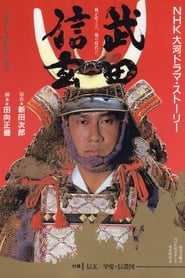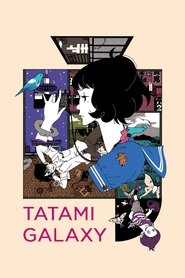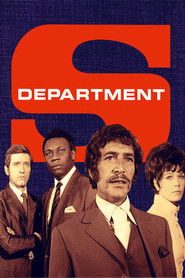Drama TV Series - Page 217
-
Takeda Shingen
1988
Takeda Shingen
1988
star 7.5There was a very turbulent time in the warring period in the history, and Takeda Shingen is consider one of the great warlord among many other. -
The Tatami Galaxy
2010
The Tatami Galaxy
2010
star 8.2When a college dropout stops for a late night bite at a mysterious ramen stand, he crosses paths with a self-proclaimed deity of matrimony. This bizarre meeting sends the young man hurtling through a horrifying flashback to his not-so-glorious college days when the influence of a cruel new friend turned him from a hopeless romantic into a mischievous “black cupid.” -
Lockerbie: A Search for Truth
2025
star 7.1Dr. Jim Swire tragically loses his daughter when Pan Am Flight 103 exploded over a small town on December 21, 1988. Travelling across continents and political divides, Swire embarks on a relentless journey that not only jeopardizes his stability, family and life, but completely overturns his trust in the justice system. As the truth shifts under Jim’s feet, his view of the world is left forever sullied. -
Mrs Playmen
2025
Mrs Playmen
2025
star 7.7Betrayed by her husband, a woman must step up and run an erotic magazine that becomes a symbol of empowerment in '70s Rome. Inspired by true events. -
A Beautiful Lie
2024
A Beautiful Lie
2024
star 8.3A rescue medical team and volunteers, including actress Qin Fei, head to a disaster area in southwest China. Initially doubted for her motives, Qin Fei proves herself by risking her life to save others. As they work together, team captain Xing Zhizhi recognizes her resilience, and they grow closer. Qin Fei later realizes that Xing Zhizhi was the doctor who saved her in a past accident, linking their fates. Together, they support each other as they pursue their careers. -
6teen
2004
6teen
2004
star 7.4At the Galleria Mall, six teens learn the ropes at their first jobs while negotiating the bumpy road through their high school years. -
Senna
2024
Senna
2024
star 8.1Fascinated by cars since childhood, Brazilian racer Ayrton Senna became a sports legend — until tragedy struck, changing Formula 1 forever. -
K.O.3an Guo
2009
K.O.3an Guo
2009
star 5.7In the Silver Dimension, Liu Bei, Guan Yu and Zhang Fei plan to enroll in an elite academy as sworn brothers, but KO One visitors derail the plan. -
Hope All Is Well With Us
2019
star 6.7Xiang Qian, the hardworking son of laborers, and Xun Zhao, raised in a cultured family, marry despite her parents’ objections. As Xiang Qian pours all his energy into climbing the ranks of a top investment firm, Xun Zhao struggles with the reality of becoming a full-time housewife. Unable to adapt and feeling increasingly left behind, their once-passionate relationship begins to crumble under the weight of ambition, sacrifice, and growing distance. -
Department S
1969
Department S
1969
star 5Department S is a United Kingdom spy-fi adventure series produced by ITC Entertainment. The series consists of 28 episodes which originally aired in 1969–1970. It starred Peter Wyngarde as author Jason King, Joel Fabiani as Stewart Sullivan, and Rosemary Nicols as computer expert Annabelle Hurst. The trio were agents for a fictional special department of Interpol. The head of Department S was Sir Curtis Seretse. -
The Bequeathed
2024
The Bequeathed
2024
star 7After the death of an unknown uncle, a woman inherits a burial ground and finds herself in the center of a string of murders and dark secrets. -
Brilliant Heritage
2020
Brilliant Heritage
2020
star 6A stepmother takes revenge on four spoiled brothers. The father feels betrayed by his sons who are always after his money. This twisted family shows conflict and the true meaning of being a family. The story revolves around Buruna Noodles and the owner of the restaurant. Each son and their wives have different dreams, but they all want one thing. -
Helix
2014
Helix
2014
star 6.6Helix is an intense thriller about a team of scientists from the Centers for Disease Control who travel to a high-tech research facility in the Arctic to investigate a possible disease outbreak, only to find themselves pulled into a terrifying life-and-death struggle that holds the key to mankind's salvation...or total annihilation. -
Raising Voices
2024
Raising Voices
2024
star 7.7When a 17-year-old reports a sexual assault at her high school, an investigation upends her life and tests her relationships. -
Keigo Higashino Mysteries
2012
star 6.811 mysteries, 11 actors. Japan's favorite mystery author, the world of Higashino Keigo comes to life on screen through an assortment of short stories. -
The Producers
2015
The Producers
2015
star 7.4A rookie producer joins the Korean Broadcasting System to be near his secret crush and enters the madcap world of network TV, where ratings rule. -
Cane
2007
Cane
2007
star 5.6The lives and internal power struggles of a powerful and wealthy Cuban-American family running an immensely successful rum and sugar cane business in South Florida. -
Hungry Heart: Wild Striker
2002
star 8.6Kyosuke Kano has lived under the shadow of his successful brother Seisuke all his life who is a professional soccer player. -
Serenade of Peaceful Joy
2020
star 5.7A story that follows Emperor Renzong of Song as he struggles between maintaining his ideologies of governing the country and his love for his daughter. -
Destined to Love You
2015
Destined to Love You
2015
star 7Set in Shanghai in the late 1910s, Qian Bao Bao is a cunning young woman who assumes the stolen identity of a female instructor at an all-male military academy in order to earn enough money to help her sick mother. During her stay at the academy, Bao Bao finds herself entangled in a complicated love triangle with the flirtatious Xiang Hao and the intelligent Shen Wen Tao, who are both instructors at the academy.



















